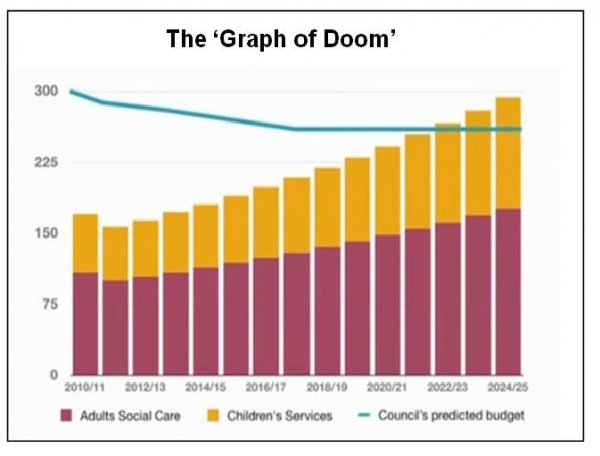Oct 19th 2022, 10:41
Blog - 19th October 2022
In this blog I consider the crisis in Adult Social Care.
The biggest casualty of the government’s failed economic policies and quest for budget cuts is likely to be the adult social care service and the millions of vulnerable people who depend on it.
Research by ‘Cumbria Crack’ (an online news platform in Cumbria) has revealed that 452 people in Cumbria are already on the waiting list for social care. That is about one person in every thousand. However, this will come as no surprise to people who work in the sector, unpaid carers or the people they care for. Furthermore, it is not a problem that is confined to Cumbria.
Local authorities are responsible for adult social care – including providing residential care and supporting people in their own homes, and they spend more on it than any other service. This means that, since austerity started, they have been forced to make cuts in adult social care. One way they have done this is by using private contractors to provide the care and by continually reducing the amount they are prepared to pay for that care. However, this model is becoming unsustainable for two reasons:
Adult social care in England has been in a serious crisis for years and it is getting worse. Even Conservative council leaders at the County Councils’ network have warned the government, that it faces a funding gap and a growing staffing shortage. According to Councillor Martin Tett (Conservative), Leader of Buckinghamshire Council:
“We face the perfect storm of staffing shortages, fewer care beds, and higher costs – all of which will impact on individuals waiting for care and discharges from hospital.”

The 'Graph of Doom' prepared by the Local Government Association. it shows how expenditure on adult social care (purple) and children's services (yellow) will soon consume all local authorities' resources (blue line).
Although social care budgets have been under pressure for years, the past few months have added an extra £1.4billion to the already large funding deficit faced by English councils, according to analysis carried out by the network, pushing many services to the edge of viability and bringing many local care providers to the brink of collapse. Some local authorities fear that if funding levels do not improve they will be unable to meet their legal obligation to provide care to local residents. Others report care providers handing back contracts because rising costs and staff shortages mean they are no longer able to provide services. The network estimates that without intervention, councils will run up a £3.7billion care funding shortfall over the next eighteen months. Any cuts forced onto councils by the Treasury in the round of budget cuts being planned by Jeremy Hunt, the Chancellor of the Exchequer, will add to this shortfall.
Liz Truss, the Prime Minister at the time of writing, has said that:
“My first priority on social care is making sure we’re getting the money into social care this winter, because we currently have too many people who are having to stay in hospital due to issues in the social care system.”
But the reality is that, in relation to need, less money will be going into social care this winter than last and that next winter the budgets are likely to be smaller while the number of people in need will increase.
Councils and private sector providers alike are struggling to recruit and retain staff when local labour market rivals like supermarkets are able to offer wage rises and staff incentives such as free food. There are currently about 165,000 social care vacancies in England and that probably means there are at least half a million vulnerable people who are not getting the social care that they need. ‘Brexit’ means that these vacancies cannot be filled by recruiting in other parts of Europe as was done in the past.
The scale of contract hand-backs in Devon has reached the point where the council has set up a dedicated team to find alternative placements for care clients whose providers walk away. Councillor James McInnes (Conservative), the cabinet member for adult social care at Devon County Council, told the Guardian that:
“It is very difficult because you can stack shelves in supermarkets and earn more money than you can in social care. We need national government to recognise this… We have never seen anything like it.”
Cathie Williams, the chief executive of the Association of Directors of Adult Social Services (ADASS), told the Guardian that:
“Too many people are missing out on vital care and support – we estimate that over half a million people are waiting for assessments, care, or reviews. With over 165,000 staff vacancies, this is only set to get worse.”
Let me give you an example. A lady of pensionable age was discharged from hospital unable to walk. She was given a care package so that she could return home with disabled adaptations and the help of paid carers and a relative as an unpaid carer. She finds the carers excellent, but they have not been allocated enough time to help her to shower. She hasn’t had a shower for some considerable time and her doctor considers this detrimental to her health. She had her bathroom converted to a disabled wet room funded by a Disabled Facilities Grant from the district council but has never been able to use the shower. Her occupational therapist has recommended that the carers’ hours be increased so they can help her to shower and the council has agreed to fund it. However, the company that provides the care cannot do this because of lack of staff. She has to wait and does not know how long for.
Some other vulnerable people are in a far worse situation than this person.
A government spokesperson told the Guardian that:
“The health and social care secretary is focused on delivering for patients and has set out her four priorities of A, B, C, D – reducing ambulance delays, busting the Covid backlogs, improving care, and increasing the number of doctors and dentists… We are investing £5.4billion over the next three years to reform adult social care – to end the lottery of unpredictable care costs and support the workforce… This includes £3.6billion to enable all local authorities to move towards paying providers a fair cost of care, and a further £1.7billion to begin major improvements across adult social care in England – on top of record annual funding to help councils respond to rising demands and cost pressures.”
But clearly this is not enough in the face of increasing need caused by longer life expectancy. National politicians appear complacent, out of touch, penny pinching and reluctant to address these problems. Local politicians who are responsible for delivering adult social care appear to focus their efforts on issues that are visible to everyone even if they are relatively insignificant – like potholes and refuse collection - rather than on issues like adult social care that are very significant for those concerned but are not in the everyday experience of many voters. National and local politicians should stop being complacent about the problems in adult social care and prioritise it.

The Civic Centre in Newcastle-on-Tyne. At one time I was the Social Services Accountant for the City Council
My next webinars will be as follows. For further information or to book a place please follow the links: